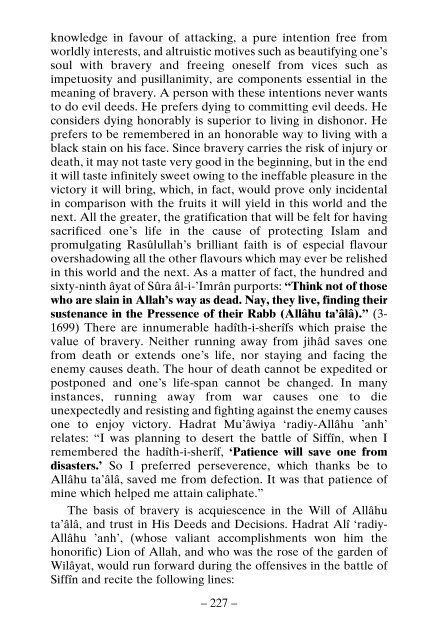Ethics of Islam
Ethics of Islam is taken from the book Berîka by Muhammad Hâdimi. Immorality and ways to get rid of it; 40 depravities and cures to them; usefulness of ethics; what is a soul; strengths of a soul; Personalities emanating from wisdom, courage, chastity and justice are extensively explained.
Ethics of Islam is taken from the book Berîka by Muhammad Hâdimi. Immorality and ways to get rid of it; 40 depravities and cures to them; usefulness of ethics; what is a soul; strengths of a soul; Personalities emanating from wisdom, courage, chastity and justice are extensively explained.
Create successful ePaper yourself
Turn your PDF publications into a flip-book with our unique Google optimized e-Paper software.
knowledge in favour <strong>of</strong> attacking, a pure intention free from<br />
worldly interests, and altruistic motives such as beautifying one’s<br />
soul with bravery and freeing oneself from vices such as<br />
impetuosity and pusillanimity, are components essential in the<br />
meaning <strong>of</strong> bravery. A person with these intentions never wants<br />
to do evil deeds. He prefers dying to committing evil deeds. He<br />
considers dying honorably is superior to living in dishonor. He<br />
prefers to be remembered in an honorable way to living with a<br />
black stain on his face. Since bravery carries the risk <strong>of</strong> injury or<br />
death, it may not taste very good in the beginning, but in the end<br />
it will taste infinitely sweet owing to the ineffable pleasure in the<br />
victory it will bring, which, in fact, would prove only incidental<br />
in comparison with the fruits it will yield in this world and the<br />
next. All the greater, the gratification that will be felt for having<br />
sacrificed one’s life in the cause <strong>of</strong> protecting <strong>Islam</strong> and<br />
promulgating Rasûlullah’s brilliant faith is <strong>of</strong> especial flavour<br />
overshadowing all the other flavours which may ever be relished<br />
in this world and the next. As a matter <strong>of</strong> fact, the hundred and<br />
sixty-ninth âyat <strong>of</strong> Sûra âl-i-’Imrân purports: “Think not <strong>of</strong> those<br />
who are slain in Allah’s way as dead. Nay, they live, finding their<br />
sustenance in the Pressence <strong>of</strong> their Rabb (Allâhu ta’âlâ).” (3-<br />
1699) There are innumerable hadîth-i-sherîfs which praise the<br />
value <strong>of</strong> bravery. Neither running away from jihâd saves one<br />
from death or extends one’s life, nor staying and facing the<br />
enemy causes death. The hour <strong>of</strong> death cannot be expedited or<br />
postponed and one’s life-span cannot be changed. In many<br />
instances, running away from war causes one to die<br />
unexpectedly and resisting and fighting against the enemy causes<br />
one to enjoy victory. Hadrat Mu’âwiya ‘radiy-Allâhu ’anh’<br />
relates: “I was planning to desert the battle <strong>of</strong> Siffîn, when I<br />
remembered the hadîth-i-sherîf, ‘Patience will save one from<br />
disasters.’ So I preferred perseverence, which thanks be to<br />
Allâhu ta’âlâ, saved me from defection. It was that patience <strong>of</strong><br />
mine which helped me attain caliphate.”<br />
The basis <strong>of</strong> bravery is acquiescence in the Will <strong>of</strong> Allâhu<br />
ta’âlâ, and trust in His Deeds and Decisions. Hadrat Alî ‘radiy-<br />
Allâhu ’anh’, (whose valiant accomplishments won him the<br />
honorific) Lion <strong>of</strong> Allah, and who was the rose <strong>of</strong> the garden <strong>of</strong><br />
Wilâyat, would run forward during the <strong>of</strong>fensives in the battle <strong>of</strong><br />
Siffîn and recite the following lines:<br />
– 227 –

















